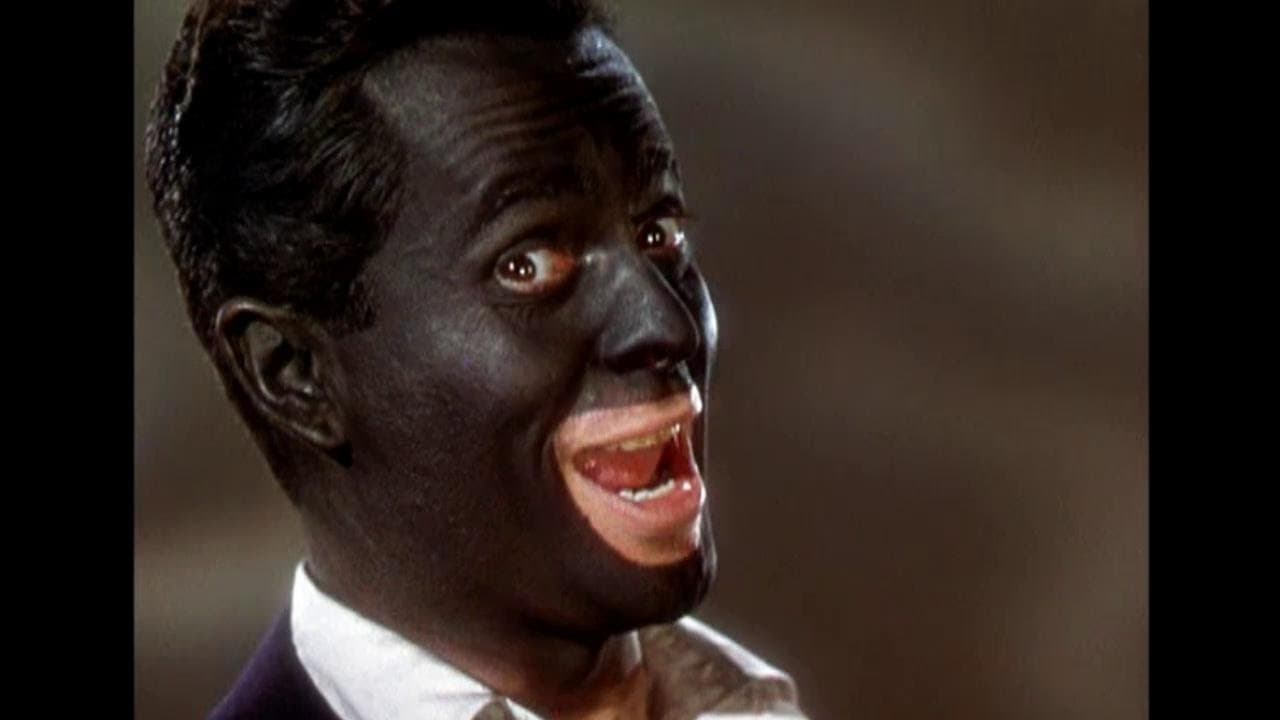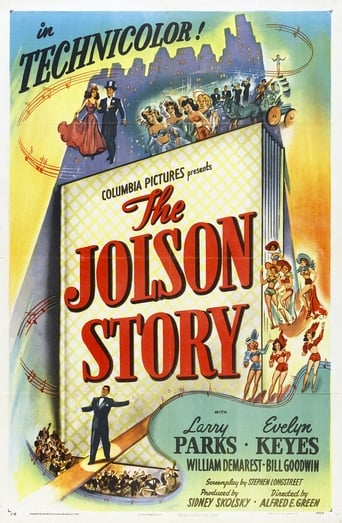Holstra
Boring, long, and too preachy.
Manthast
Absolutely amazing
Nicole
I enjoyed watching this film and would recommend other to give it a try , (as I am) but this movie, although enjoyable to watch due to the better than average acting fails to add anything new to its storyline that is all too familiar to these types of movies.
Billy Ollie
Through painfully honest and emotional moments, the movie becomes irresistibly relatable
vincentlynch-moonoi
We all know that bio-pics of the era weren't very accurate...but that's okay...this is simply an interesting film. It's fairly well known that Jolson wanted to play himself in this film, but thank goodness he wasn't allowed to do so. Not just because he was too old for the part, but also because his ego would have ruined the film. Larry Parks was able to make Al Jolson likable...something Jolson couldn't have done for himself. And by the way, Larry Parks' lip-sinking to the real Jolson singing is simply outstanding. The same can be said for Scotty Beckett as he was playing the young Jolson.Of course, there's a lot of Black face in this film. Get over it. History -- whether pleasant or not -- is still history. And, if you read up on Jolson, you'll find that he was extremely popular with African-Americans of the time, and they flocked to honor him at his funeral. We can't understand it all now. That's not excusing the cultural faux pas (and that's putting it mildly) of Black face, but, the Black face phenomenon may not have been as black and white (no pun intended) as we see it today. Something to think about.Larry Parks was something of a one hit wonder (with the emphasis on "hit"), but his performance here is really one of the greatest performances in any bio-pic.And then there's Jolson. I was only a baby when Jolson died, but I've always thought that Jolson was something special...special unique. I don't imagine many of us would have liked him personally, and his voice was certainly not a traditional vocalist's voice of almost any era. But again, it was unique, and by the time this film was made, a special kind of mellow with high energy.And then there's the supporting cast. William Demarest, not usually one of my favorite character actors (although he's always "okay"). But, this role is more diverse for Demarest and he shines in it. Evelyn Keyes is also excellent as Julie Benson -- an amalgam of Jolson's actual 4 wives. Bill Goodwin is good as another performer and eventual director of a theater. Ludwig Donath is quite charming as Cantor Yoelson, Al's father. Scotty Beckett is excellent as the young Al Jolson. Tamara Shayne is good as Al's mother.Although the film pretends Jolson had only one wife (he actually married 4 times), they way they handle the rigors of show business and the effect it had on Jolson's marriages. Quite cleverly done.To be honest, aside from Larry Parks' off-color front tooth, which I found rather distracting, there's not much to criticize here (other than the typical bio-pic white wash), and much to praise. Back then, it was so popular that it revived Jolson's seriously flagging career just a few years before his death. BTW, if you have a chance, listen to the Bing Crosby - Al Jolson radio performances which are on DVD...quite fun and memorable.
grantss
Historically inaccurate, but the music is good. Allegedly the story of the life of Al Jolson, but is biographical and accurate only in the Hollywood sense. Far too much poetic license is taken with the plot, to the point that after a while you wonder if anything you saw is true. the biggest example of this is the implication that Jolson was first married, to Julie Benson, around the time he made The Jazz Singer (1927). He did get married, to Ruby Keeler, in 1928, but this was his third marriage! Wouldn't want to ruin the "hero eventually meets his perfect one after putting his career first and much disappointment, dating-wise" plot you figured would work on audiences, would you now, Hollywood? I guess the fact that her name was changed should be a clue that this is a work of fiction...The "happily ever after" ending was also fictional, as they divorced in 1940, six years before the movie was made. On the positive side, some good music and stage performances.On that note, Larry Parks is kind of hit-and-miss as Al Jolson. His stage performances are good, and seem to portray well the larger- than-life, complete entertainer nature of Al Jolson. However, in the off-stage scenes he comes across as overbearing, overly energetic, phony and downright irritating.If you are interested in the correct history of Al Jolson, don't watch this. Watch a History Channel documentary instead, or just read Wikipedia.
robert-259-28954
What is so amazing about this film is how well it still stands up after all these years. When watching it, you can hardly believe it was made in 1946!! But this movie mainly belongs to the superb Larry Parks, who as many have remarked, "Was even better than Al Jolson," in his remarkable recreation. In fact, his performance was one of the best I've seen, clearly as good as Jamie Foxx as Ray Charles, or any of the many others that were to follow. The reason I called this movie a perfect film, was because it embodied all of the qualities a great movie should, from casting, to script, to direction and production values. I remember fondly enjoying this film as a young boy, and after watching on TV in 2013, it still managed to entertain. Kudos to the great William Demarest as Jolson's mentor and manager. But by far the only sad moment in this story was the REAL one, when Parks' burgeoning career was destroyed utterly by our version of The Spanish inquisition, the Joseph McCarthy era of fear and loathing in Los Angeles. May we never live to see such an abomination of what made this country great again.
reflex-1
I agree that Larry Parks should have received an Oscar for this performance. It's an amazing job! And, yes, joleson's parents were made to look alittle too sweet, and the dialog between Larry Parks and Evelyn Keyes was somewhat stilted, but every time Jolson sings, all is forgiven. Every time Parks plays Jolson singing, all is forgiven. In the opening scene, in which Scotty Beckett plays young Jolson, I am always stunned at the beauty of that singing voice. Does anyone know whose voice it was? Was it Scotty's? I am disappointed at criticism of this movie on the issue of Al Jolson's performing in black face. It is a historical fact that he did it, and to attempt to write it out of history is not helpful to anyone. The fact that this movie was presented after World War II and was a resounding hit is evidence, I believe, that it is the music and the way it was performed, and not the black face, that people loved. This fine movie preserves a whole era of American show business, and it is powerful enough to still bring tears to the eyes.

